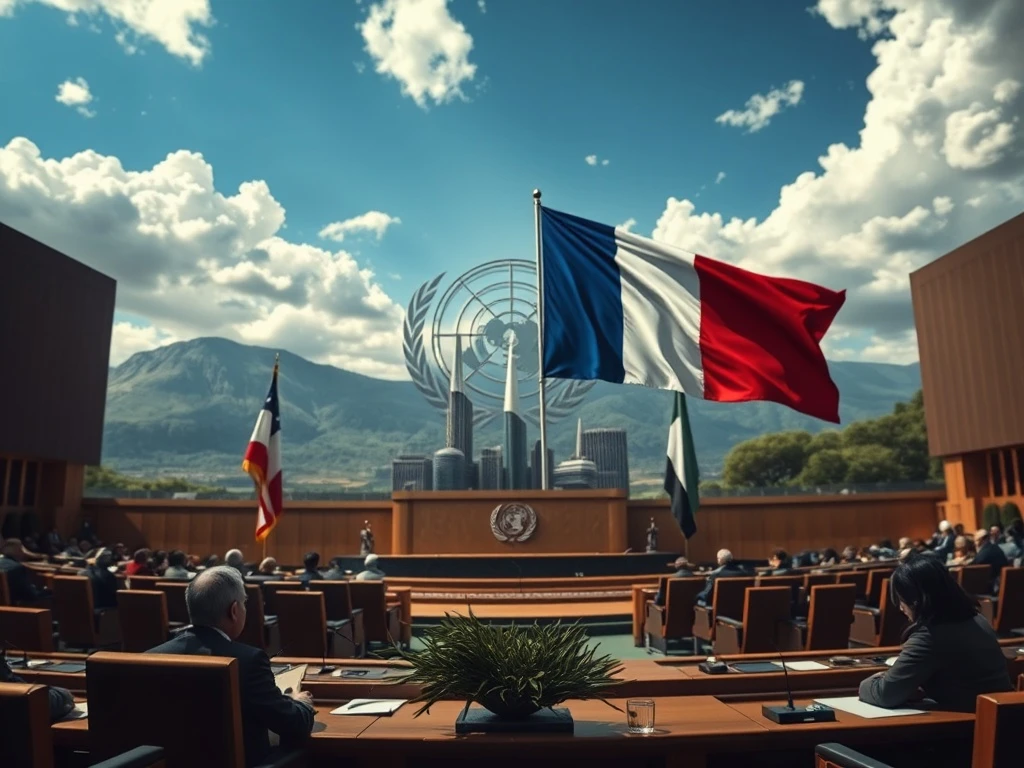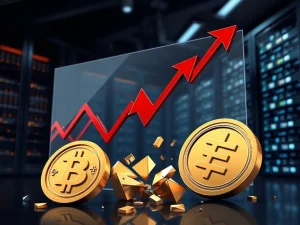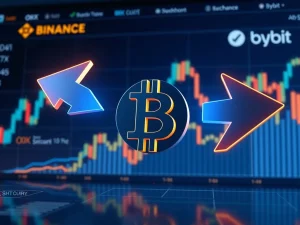Historic Shift: France’s Unprecedented Recognition of Palestinian Statehood and Its Crypto Geopolitics Impact

In a world increasingly shaped by geopolitical currents, major diplomatic shifts can send ripples across various sectors, including financial markets. While the immediate focus often lands on traditional assets, the cryptocurrency landscape, known for its volatility and sensitivity to global events, sometimes offers surprising resilience. This article delves into a monumental development in international relations: France’s decision to recognize Palestinian statehood. We’ll explore the profound implications of this move and, interestingly, why the world of digital assets appears to be shrugging it off. For those navigating the complex interplay of global politics and digital finance, understanding these dynamics is crucial.
France Palestine Recognition: A Diplomatic Earthquake
On July 24, 2025, a significant announcement from Paris reverberated across the globe: France would formally recognize Palestine as a state at the United Nations General Assembly in September 2025. This declaration, confirmed by President Emmanuel Macron, isn’t just another diplomatic gesture; it’s a strategic move that fundamentally reshapes the diplomatic landscape of the Israeli-Palestinian conflict. Macron framed the decision as a “historical commitment to a just and lasting peace in the Middle East,” aligning it with France’s humanitarian priorities in Gaza and its broader foreign policy goals of multilateralism and human rights advocacy.
This follows an earlier outline of the plan in April 2025, demonstrating a deliberate and calculated approach by the Macron administration. The timing, amid escalating tensions from the Israel-Hamas conflict, signals a strategic effort to balance domestic and international pressure for stronger action on humanitarian crises in Gaza.
Why This G7 Diplomatic Shift Matters
The significance of France’s decision cannot be overstated. By formally declaring its recognition at the UN, France will become the first G7 nation to extend statehood to Palestine. This G7 diplomatic shift carries immense symbolic weight and could set a precedent for other major global powers. Here’s why it’s a game-changer:
- Setting a Precedent: As a leading member of the G7, France’s move could pressure other EU nations and developed economies to re-evaluate their own stances on Palestinian statehood.
- Elevating the EU’s Role: This decision positions the European Union at the forefront of calls for statehood recognition, potentially recalibrating EU foreign policy and giving it more independent agency in Middle East diplomacy.
- Challenging the Status Quo: The recognition directly challenges the long-standing U.S. and Israeli opposition to unilateral recognition efforts, potentially deepening transatlantic tensions if more nations follow suit.
- Renewed Momentum at the UN: With France’s support, the Palestinian statehood agenda may gain renewed momentum in global forums, pushing the issue further up the international agenda.
President Macron’s statement at the UN General Assembly underscored the intent to mobilize international partners for peace: “In doing so, France intends to make a decisive contribution to peace in the Middle East.”
Navigating the Complexities of Palestinian Statehood
The path to full Palestinian statehood is fraught with complexities, and France’s recognition, while significant, is just one step in a much longer journey. The reactions to this decision have been, predictably, sharply divided:
- Israeli Condemnation: Israeli Prime Minister Benjamin Netanyahu condemned the plan as an affront to regional stability, viewing it as a reward for Hamas and an obstacle to future negotiations.
- U.S. Criticism: U.S. officials echoed concerns, criticizing the move as a potential obstacle to ongoing peace negotiations, preferring a two-state solution achieved through direct talks.
- Palestinian Praise: Conversely, Palestinian President Mahmoud Abbas praised the recognition as a critical step toward international legitimacy and a reinforcement of Palestinian rights.
Analysts suggest that while such symbolic gestures are crucial for international legitimacy, they alone are unlikely to resolve core issues that have plagued the conflict for decades. These include:
- Borders: Defining the precise borders of a future Palestinian state, particularly concerning Israeli settlements.
- Security: Addressing Israel’s security concerns and establishing effective security arrangements for both sides.
- Governance: Establishing a unified and effective Palestinian governance structure across the West Bank and Gaza.
- Jerusalem: The status of Jerusalem remains one of the most contentious issues.
Macron’s administration has stressed that the move is part of a long-term diplomatic strategy, prioritizing “lasting peace” over immediate geopolitical gains.
Middle East Peace: A Long Road Ahead
The concept of Middle East peace is a persistent, yet elusive, aspiration. France’s recognition injects new energy into the debate, but it also highlights the deep divisions that persist. The international community remains largely committed to a two-state solution, where an independent Palestinian state exists peacefully alongside Israel. However, the means to achieve this goal are fiercely debated.
This diplomatic maneuver by France is a clear signal that a significant portion of the international community believes that recognizing Palestinian statehood is not just a moral imperative but also a practical step towards achieving a lasting resolution. It puts pressure on other nations, particularly those in the EU, to consider similar actions, potentially creating a domino effect that could alter the global diplomatic landscape around the conflict.
However, the road to comprehensive peace remains arduous. Real progress will require genuine political will from all parties, a willingness to compromise on deeply held positions, and robust international mediation efforts that can navigate the complex web of historical grievances, security concerns, and political aspirations.
Unpacking the Crypto Geopolitics Angle
Given the dramatic nature of France’s decision, one might expect a ripple effect across global financial markets. However, when it comes to crypto geopolitics, the immediate impact has been notably subdued. The article explicitly states that cryptocurrency markets have shown no notable reaction, with traditional safe-haven assets like Bitcoin (BTC) and Ethereum (ETH) remaining unaffected.
Why the apparent disconnect? Several factors contribute to this:
- Long-Term Strategy: France’s announcement, while significant, is part of a long-term diplomatic strategy, not a sudden, unforeseen crisis. Markets often react more to immediate, unexpected shocks.
- Symbolic vs. Material Impact: While politically and diplomatically impactful, the recognition’s immediate material or economic consequences on global trade, supply chains, or financial stability are limited. Cryptocurrency markets tend to react more strongly to events with direct economic implications.
- Decoupling Trend: While once highly correlated with traditional markets, cryptocurrencies sometimes exhibit a degree of decoupling from specific geopolitical events, especially those that don’t directly threaten the global financial system or major economies where crypto adoption is high.
- Historical Precedent: As the source notes, historical precedents suggest that such geopolitical recognitions rarely influence digital asset performance. The crypto market’s drivers are often more tied to macroeconomic indicators, technological developments, regulatory news, or broad market sentiment rather than specific diplomatic shifts in a localized conflict, unless those shifts escalate into major global crises impacting trade or energy markets.
This lack of reaction underscores a fascinating aspect of crypto markets: their selective sensitivity to geopolitical events. While major conflicts or economic crises can certainly influence sentiment and price, not every significant diplomatic development translates into immediate market movement.
Conclusion
France’s groundbreaking decision to recognize Palestinian statehood at the UN in September 2025 marks a truly historic moment in international diplomacy. As the first G7 nation to take this step, France has undeniably reshaped the landscape of the Israeli-Palestinian conflict, potentially setting a new precedent for global engagement and reinvigorating the push for a two-state solution. While the path to a just and lasting peace in the Middle East remains complex and fraught with challenges, this diplomatic shift is a powerful statement of intent and a testament to the evolving dynamics of international relations.
Interestingly, despite the profound geopolitical implications, the cryptocurrency markets have remained largely unfazed. This highlights the nuanced relationship between global politics and digital asset performance, reminding us that while crypto is part of the global financial ecosystem, its reactions to geopolitical events are often driven by direct economic consequences rather than symbolic gestures alone. As we move forward, the world will be watching closely to see how this historic recognition impacts both the future of the Middle East and the broader global diplomatic stage.
Frequently Asked Questions (FAQs)
Q1: What does France’s recognition of Palestinian statehood mean?
France’s decision means it will formally acknowledge Palestine as an independent state at the United Nations General Assembly in September 2025. This is a significant diplomatic move as France will be the first G7 nation to do so, lending substantial international legitimacy to the Palestinian cause.
Q2: Why is France recognizing Palestine now?
President Macron stated the decision is a “historical commitment to a just and lasting peace in the Middle East,” aligning with France’s humanitarian priorities in Gaza and its foreign policy goals. The timing, amidst the ongoing Israel-Hamas conflict, also reflects a strategic effort to address international pressure for stronger action on humanitarian crises.
Q3: How have other nations reacted to France’s decision?
Reactions have been divided. Israeli Prime Minister Benjamin Netanyahu condemned the plan, while U.S. officials criticized it as a potential obstacle to peace negotiations. Conversely, Palestinian President Mahmoud Abbas praised the recognition as a critical step toward international legitimacy. Other EU nations may face pressure to follow suit.
Q4: Will this recognition lead to immediate peace in the Middle East?
While the recognition is a significant diplomatic step, analysts suggest that symbolic gestures alone are unlikely to resolve core issues such as borders, security, and governance. The path to lasting peace remains complex and requires direct negotiations and compromises from all parties involved.
Q5: How has the cryptocurrency market reacted to this geopolitical event?
The cryptocurrency market has shown no notable reaction to France’s decision. Traditional safe-haven assets like Bitcoin (BTC) and Ethereum (ETH) remained unaffected. Historical precedents suggest that such geopolitical recognitions rarely influence digital asset performance unless they lead to direct, widespread economic disruptions.









